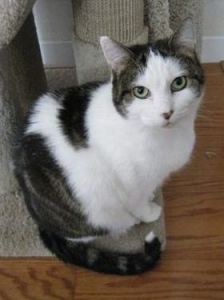My friend the primatologist once told me that young mammals appear cute to humans so that we’ll take care of them. (We evolved to appreciate the “cute” characteristics rather than the other way around.) Who doesn’t want to cuddle a kitten or rub the belly of a new puppy?
This is part of what makes older animals so hard to adopt. They no longer possess the attributes (big heads, playfulness, clumsy maneuvers, etc) that pull on our heartstrings. When kittens fill up the shelters, older cats are often sacrificed to make room for the “more adoptable” kittens, and by older, we mean cats sometimes as young as one—those who’ve lost their kitten-appeal.
But there are many good reasons to adopt older cats:
- Adult cats are neutered and have had their shots; they are generally trained to use a litter box
- What you see is what you get—you know what the cat will look like, what her size will be, and what her personality is.
- Whether teething or just exploring, kittens can be very destructive chewers. Adult cats typically chew less, if at all.
- Kittens tend to get into much more trouble. They climb you or your curtains, fall from high places, and knock over collectibles like your mother’s Belleek (ask me how I know). Adult cats have manners.
- Older cats require less time and energy. Give them some quality time each day, but not your entire day. They are usually content to curl with you and snuggle in for a long nap.
- While adult cats groom, kittens are just too busy exploring to clean themselves properly.
- Adult cats may sleep with you or in their own cosy spot but they are generally happy to sleep when you do. Kittens often run around through the night, doing anything possible to wake you up for fun and games.
Relinquished cats aren’t “defective” There are lots of reasons cats ends up in shelters: family members developed allergies, or the owner is moving to assisted living, or the landlord said the cat has to go. They weren’t bad cats; they were just with the wrong people. But an adult cat might be the right cat for your family:
- For homes with small children: a young adult. Little kids are often much too rough with kittens. Adult cats are better equipped to deal with kids. The wily cats can generally escape from children and hide.
- For working people: young adult cat. Kittens become bored and mischievous when left home alone, but older cats know how to entertain themselves.
- For senior human: senior cat. Older cats often end up in shelters because their human companions have died, and no relatives or friends wanted to take them in. Senior cats are perfect for senior citizens who might pre-decease a younger cat.
- For a household with a senior cat mourning a companion: another senior cat. A natural choice because older cats don’t tolerate the stress of a new kitten. With careful introduction, you can find companionship for your aging cats.
Older cats are grateful for a second chance at a loving home, and when you adopt them that gratitude is showered on you. If a senior cat is right for you, please check out Maggie; if a young adult will complete your home, consider Frida, Blaze, or Marcus.





Logically wouldn’t there be selection pressure both for characteristics that confer “cuteness” and for appreciation of it? After all, appreciating cute kitties probably hasn’t had that much selection impact on humans although appreciating babies’ cuteness would. Most of the qualities that attract us are similar in humans and other mammals.
Yes. Exactly.